

Recent College Graduates Wait for Their Real Careers to Begin. Social Inequality and the New Elite. IT’S a puzzle: one dispossessed group after another — blacks, women, Hispanics and gays — has been gradually accepted in the United States, granted equal rights and brought into the mainstream.
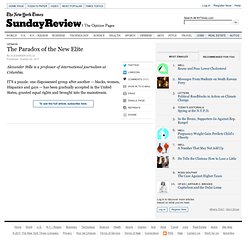
At the same time, in economic terms, the United States has gone from being a comparatively egalitarian society to one of the most unequal democracies in the world. The two shifts are each huge and hugely important: one shows a steady march toward democratic inclusion, the other toward a tolerance of economic stratification that would have been unthinkable a generation ago. The United States prides itself on the belief that “anyone can be president,” and what better example than Barack Obama, son of a black Kenyan immigrant and a white American mother — neither of them rich. And yet more than half the presidents over the past 110 years attended Harvard, Yale or Princeton and graduates of Harvard and Yale have had a lock on the White House for the last 23 years, across four presidencies.
Graduates Versus Oligarchs. Dean Baker raises an important point here: it’s really awfully late in the game to be saying that the important inequality issue is college graduates versus non-graduates.
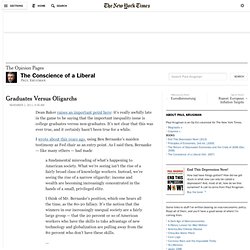
It’s not clear that this was ever true, and it certainly hasn’t been true for a while. I wrote about this years ago, using Ben Bernanke’s maiden testimony as Fed chair as an entry point. As I said then, Bernanke — like many others — had made a fundamental misreading of what’s happening to American society. What we’re seeing isn’t the rise of a fairly broad class of knowledge workers. Let me illustrate this point with some CBO data. There has been no rise in the share of the 81-99 group! Second, even within the top 1 percent the gains are going mainly to a small minority. The big gains have gone to the top 0.1 percent. So income inequality in America really is about oligarchs versus everyone else. A College Degree, but Not a College Job. Wal-Mart Benefits From Anger Over Banking Fees. Wall St. Layoffs Take Heavy Toll on Younger Workers. Ruth Fremson/The New York TimesSteve Ferdman, 28, was laid off twice by Credit Suisse.
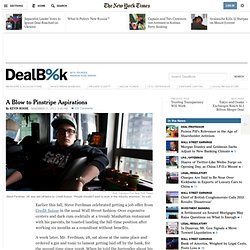
“People shouldn’t want to work in this industry anymore,” he said. Earlier this fall, Steve Ferdman celebrated getting a job offer from Credit Suisse in the usual Wall Street fashion. Over expensive oysters and dark rum cocktails at a trendy Manhattan restaurant with his parents, he toasted landing the full-time position after working six months as a consultant without benefits. A week later, Mr. Ferdman, 28, sat alone at the same place and ordered a gin and tonic to lament getting laid off by the bank, for the second time since 2008. “I did everything right. Being young on Wall Street once meant having it all: style, smarts and too much money to spend wisely. The One Percent 1/8. S Capital with David Harvey » Blog Archive » The Vote to End Capitalism. How does capitalism get reproduced over time?
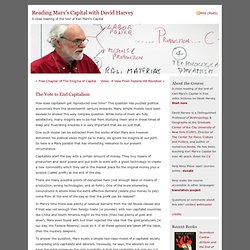
This question has puzzled political economists from the seventeenth century onwards. Many simple models have been devised to answer this very complex question. While none of them are fully satisfactory, many insights are to be had from studying them and in these times of deep and frustrating troubles it is very important that we do just that. One such model can be extracted from the works of Karl Marx and however abhorrent his political views might be to many, we ignore his insights at our peril. So here is a Marx parable that has interesting relevance to our present circumstance. Capitalists start the day with a certain amount of money. There are many possible points of disruption here (not enough labor or means of production, wrong technologies, and so forth).
To answer the question, Marx builds a simple two-class model of a capitalist society comprising only capitalists and laborers. Land of the free, home of the hungry. On Monday afternoon this week, Rachelle Grimmer went into a Department of Health and Human Services in Texas with her two children, Timothy, aged 10, and Ramie, aged 12, and asked for a new case worker who could assist her application for food stamps.
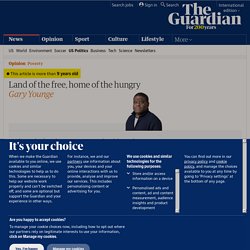
She had first applied in July but had been told she hadn't provided enough information and, by most accounts, had been struggling to get by and get help since she moved from Ohio. She was taken to a small room, where she pulled a gun, sparking a seven-hour standoff with police. Shortly before midnight, three shots were heard. Rachelle had shot both herself and her kids. Police rushed in to find the mother dead and Ramie and Timothy in critical condition. Paul Krugman. Paul Krugman joined The New York Times in 1999 as a columnist on the Op-Ed Page and continues as professor of Economics and International Affairs at Princeton University.

Mr. Krugman received his B.A. from Yale University in 1974 and his Ph.D. from MIT in 1977. He has taught at Yale, MIT and Stanford. At MIT he became the Ford International Professor of Economics. Mr. Depression and Democracy.